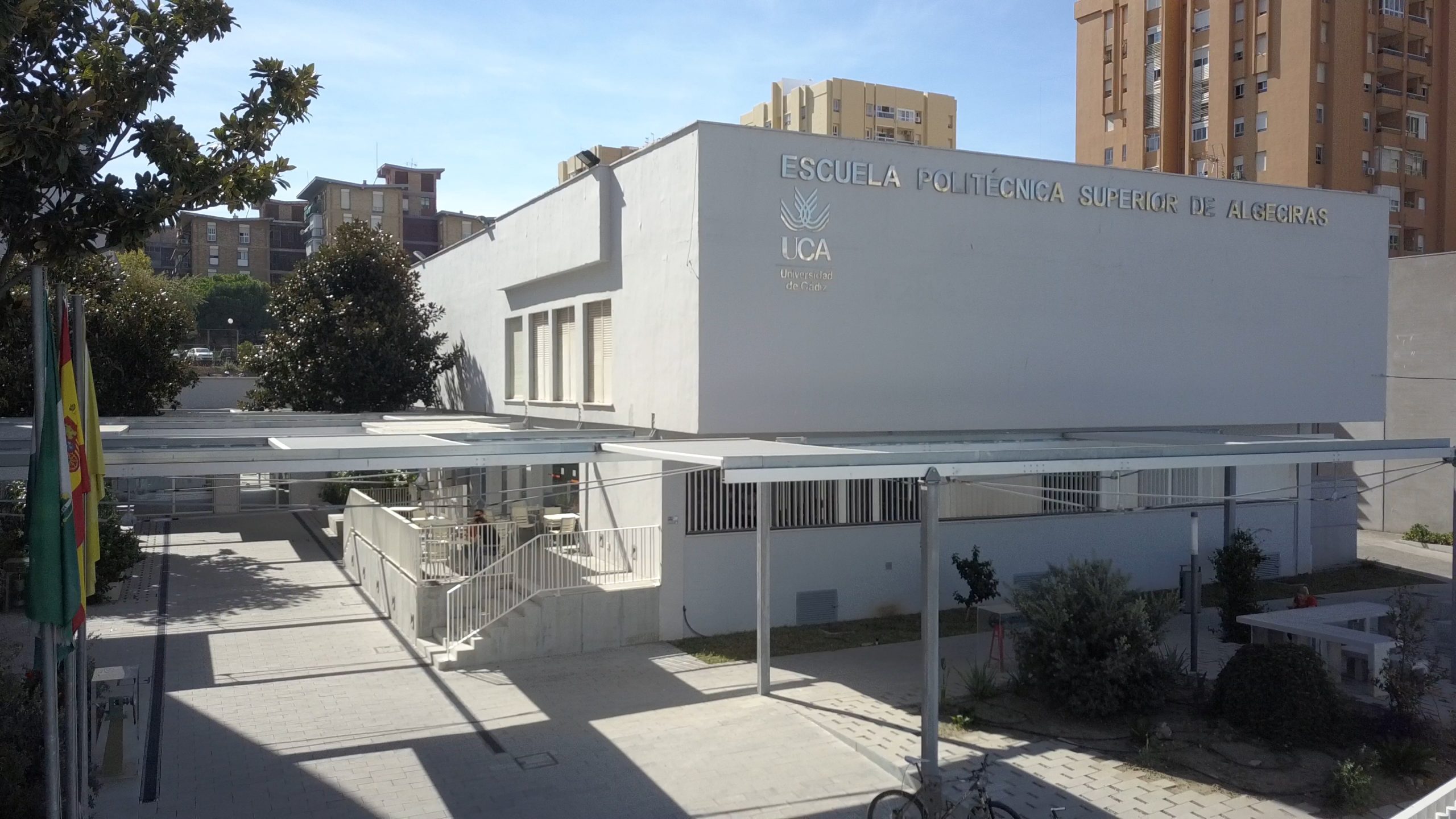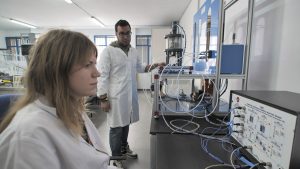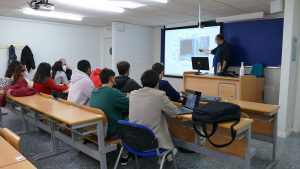
The Algeciras School of Engineering and Techmology (ASET) began as the University School of Technical Industrial Engineering by Decree 2,530/1975 on October 9, dependent on the University of Seville until the creation of the University of Cádiz in October 1979.
The Resolution of the General Directorate of Universities on October 15, 1976, stipulated that the School was to start its academic journey for the 1976/77 academic year with the first common course for all specialties of Technical Industrial Engineering.
Given the task as the first Director was Mr. Miguel Borrero Vázquez (1976/82), to launch the University Center.
The initially offered specialisation was Industrial Chemistry, including sections on Installations and Chemical Processes, and Metallurgy. The support of industries in the Campo de Gibraltar was decisive in the founding of the School, both in its creation and financing at the outset. It is essential to highlight the significant contributions made by public institutions and private entities in the area during the early stages of the School. The 1976/77 course was held in a classroom at the School of Industrial Mastery “Ventura Morón,” and in the following academic year, 77/78, the second year of the degree was planned to be taught at the School of Arts and Crafts in Algeciras, with the first promotion of Industrial Chemistry Engineers (Section: Installations of Chemical Processes and Metallurgy) completing their studies in the 1978/1979 academic year.
From the 1982/83 academic year, the School has its own building. The land was provided by the City Council of Algeciras, and its construction was primarily funded by the Ministry of Education and Science, with the participation of the Provincial Government of Cádiz.
In the 1983/84 academic year, specialisations in Electricity and Mechanics began. Subsequently, the offering of degrees in the industrial field was completed, mainly in Technical Industrial Engineering with specialisations in Mechanics, Electricity, Industrial Electronics, and Industrial Chemistry, which have remained active in the School to this day.
In the 1988/89 academic year, the University School of Technical Industrial Engineering became the Polytechnic University School by including the degree in Technical Civil Engineering in its offerings. This marked the establishment of the first center to offer Civil Engineering in Andalusia, with civil engineering becoming part of its identity. At that time, Professor D. Alfonso Corz Rodríguez served as the Director of the School (1983/91).
After the curriculum reform, the Technical Engineering degrees in Industrial Chemistry, Industrial Electronics, Electricity, and Mechanics transformed into degrees in 1994/95. In the 1993/94 academic year, the degree in Technical Civil Engineering began to be offered.
In 1989, after completing the necessary procedures and achieving the conversion to a Polytechnic University School, a second challenge was undertaken: the implementation of a second cycle of Industrial Engineers. This proposal was approved by the School Board on November 3, 1989; it was also approved by the Governing Board of the University of Cádiz on December 20 of the same year and by its Social Council on March 30, 1990. In 1998, the Andalusian Council of Universities approved the implementation of the Second Cycle of Industrial Engineering and its corresponding curriculum. The title has been offered since the 1998/99 academic year, leading to the change in its name to Polytechnic School of Algeciras (EPS de Algeciras). In 1992, Professor D. Francisco José Trujillo Espinosa was elected as the third Director of the School (1992/2003).
The School’s sphere of influence extends to a population of around 350,000 inhabitants and is characterized as one of the most significant industrial and port centers in Andalusia and Spain. The area is home to various industrial sectors, including refining, petrochemicals, steelmaking, and energy, along with a significant number of small and medium-sized enterprises.
To meet the demand for doctoral studies from various universities, as the industrial core and the port demand university graduates who, once established, feel the need to continue their studies, a Doctorate in Industrial Engineering program was designed in the 1980s. This program became consolidated in our School from the 1993-95 biennium, with active participation from major industries in the region, laying the foundation for research at the center.
Since the 2002/03 academic year, the Civil Engineering Technical specialties have expanded to include all three: Civil Construction, Hydrology, and Transportation and Urban Services. In the 2007/08 academic year, the offering was completed with double degrees, namely Civil Construction and Hydrology, and Civil Construction and Transportation and Urban Services.
From the year 2003, the School has participated in the development of White Papers for industrial branch degrees. Since 2004, it has been part of the Andalusian Commission for the implementation of the European Credit Transfer System (ECTS) in Technical Industrial Engineering degrees, developing common guides and defining ECTS sheets for core subjects of these degrees. During the 2003/2012 period, Professor D. Ignacio Turias Domínguez served as the Director.
In the 2004/05 academic year, the double degree in Technical Industrial Engineering, specializing in Electricity and Industrial Electronics, was also offered.
In the 2003/04 academic year, the expansion of the School began, culminating in the 2004/05 academic year with the operation of the new workshops and laboratories building, and in the 2006/07 academic year with the inauguration and operation of the new lecture hall, allowing all teaching to be transferred to these new facilities.


In July 2005, the project for the Institute of Technological Development of the Bay of Algeciras was approved, funded by the European Regional Development Fund (ERDF). With a useful area of over 700 square meters, it can be considered a historic milestone for our School, its research, and its capacity for technological transfer.
The construction of the European Higher Education Area (EHEA) involves a new organization of university education at different levels (Bachelor’s, Master’s, Ph.D.), aiming to ensure the quality of the educational offerings.
Thus, in 2009, the planning of the teachings corresponding to the study plans of the Bachelor’s Degree in Industrial Engineering Technologies began. This established the requirements for the verification of official university degrees enabling the practice of the profession of Technical Industrial Engineer and the Bachelor’s Degree in Civil Engineering enabling the practice of the profession of Technical Civil Engineer.
In the 2010/11 academic year, the Bachelor’s Degree in Industrial Engineering Technologies and the Bachelor’s Degree in Civil Engineering were implemented. The former consists of four specializations corresponding to the specific technologies of Electricity, Industrial Electronics, Mechanics, and Industrial Chemistry. The latter has three specializations corresponding to the specific technologies of Civil Construction, Hydrology, and Transportation and Urban Services.
As a continuation of the four Technical Industrial Engineering degrees offered by the University of Cádiz in the previous curriculum, the Bachelor’s Degrees in Electrical Engineering, Industrial Electronics Engineering, and Mechanical Engineering began in the 2013/14 academic year. The implementation of the Bachelor’s Degree in Industrial Chemistry Engineering was postponed due to the similarities with the Bachelor’s Degree in Chemical Engineering, which was already being offered by the University.
In the 2010/11 academic year, the Master’s Degree in Computational Engineering Modeling was also implemented, derived from the Computational Industrial Engineering Ph.D. program of the University of Cádiz, which had received quality mention. These studies represent continuity with the Ph.D. program, which gained wide acceptance in the socio-economic environment and allowed for the research training of students.
The School collaborates with the most important industries in the region, evident in the establishment of company chairs such as the Cepsa Foundation Chair and the ACERINOX Chair, among others.
In 2013, the implementation of new Master’s programs began, with a strong focus on Industrial Engineering. This master’s program replaced the second-cycle title of Industrial Engineer, which, as mentioned earlier, had been offered at the Polytechnic School of Algeciras since the 1998/99 academic year. Additionally, efforts are made in the fields of Civil Engineering, Canal and Port Engineering, and Energy, both professionally and academically. Thus, our center has maintained a strategic role with society in general and its surroundings in particular, following an organized and coherent perspective at all times.
Within the framework of the University of Cádiz’s Bay of Algeciras Campus, the education of graduates in the field of Civil Engineering is especially relevant. Therefore, in a School Board meeting on February 22, 2008, it was approved to request the implementation of the Master’s Degree in Civil Engineering (Roads, Canals and Ports) for its incorporation into the future map of Andalusian university degrees.
In this sense, the degrees are perfectly aligned, establishing a sequence of bachelor’s degrees in the field of Industrial Engineering and Civil Engineering. These bachelor’s degrees specialize in master’s degrees in Industrial Engineering, Canal and Port Engineering, and an academic master’s degree in Renewable Energies and Energy Efficiency. The Master’s Degree in Occupational Risk Prevention is also a key component in the industrial and port environment in which the School is located.
Currently, the official name of our centre is the Algeciras School of Engineering and Technology, and its academic offer includes the following degrees:
- Bachelor’s Degree in Civil Engineering (GIC)
- Bachelor’s Degree in Industrial Engineering Technologies (GITI)
- Bachelor’s Degree in Industrial Electronics Engineering (GIEI)
- Bachelor’s Degree in Mechanical Engineering (GIM)
- Bachelor’s Degree in Electrical Engineering (GIE)
- Master’s Degree in Industrial Engineering (MII)
- Master’s Degree in Canal, Channel, and Port Engineering (MICCP)
- Master’s Degree in Renewable Energies and Energy Efficiency (MEREE)
- Master’s Degree in Occupational Risk Prevention (MPRL)
The School has played a decisive role in accrediting the Ph.D. program in Energy and Sustainable Engineering by the University of Cádiz. Although integrated into the UCA Doctoral School, the program is coordinated and taught at our center from the 2016-17 academic year to the present.
In October 2021, the new Campus Library was inaugurated on the School’s own plot, adjacent to the main building. This new learning space facilitates interaction with students from other areas of knowledge and becomes the hub of Campus University life.




